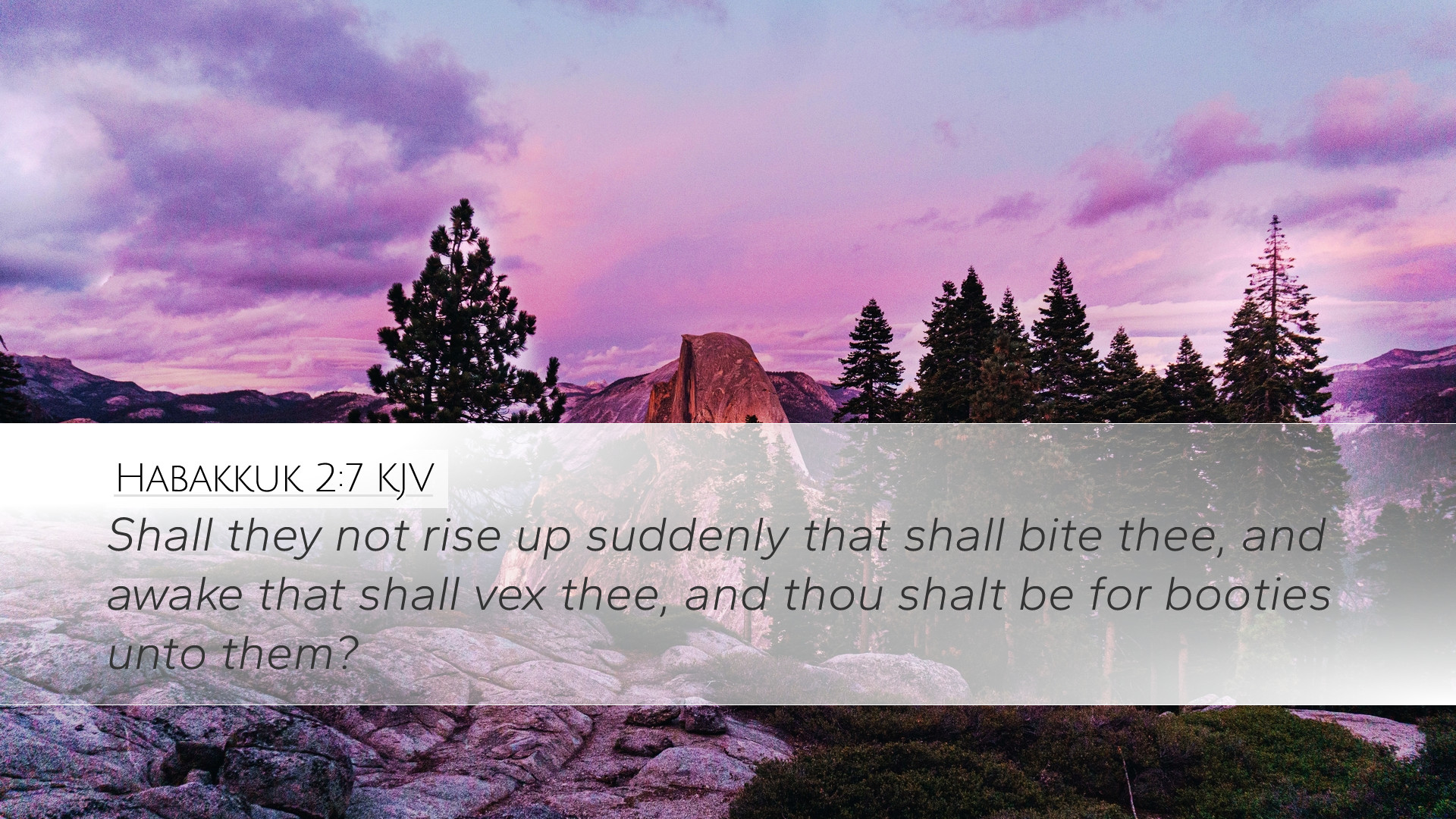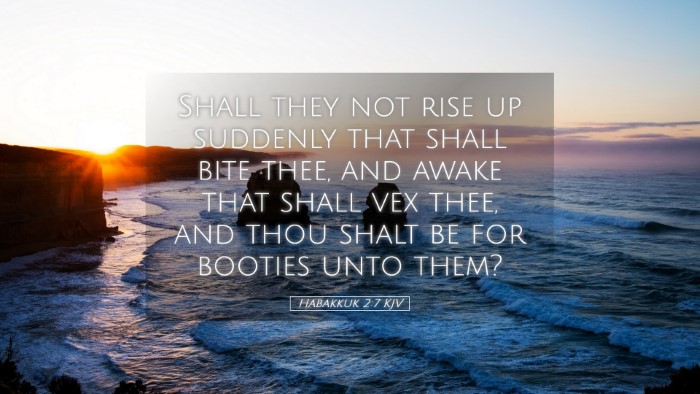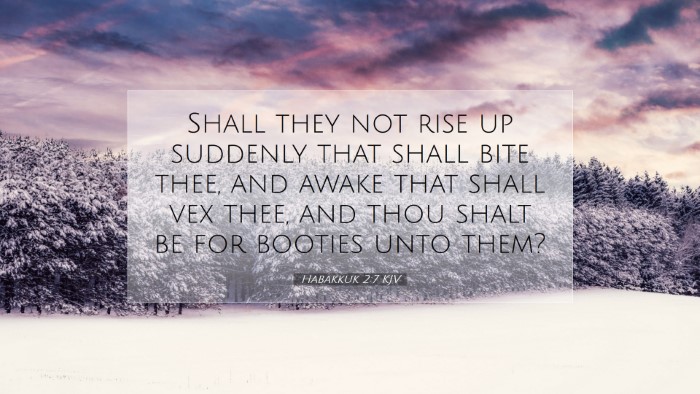Old Testament
Genesis Exodus Leviticus Numbers Deuteronomy Joshua Judges Ruth 1 Samuel 2 Samuel 1 Kings 2 Kings 1 Chronicles 2 Chronicles Ezra Nehemiah Esther Job Psalms Proverbs Ecclesiastes Song of Solomon Isaiah Jeremiah Lamentations Ezekiel Daniel Hosea Joel Amos Obadiah Jonah Micah Nahum Habakkuk Zephaniah Haggai Zechariah MalachiHabakkuk 2:7
Habakkuk 2:7 KJV
Shall they not rise up suddenly that shall bite thee, and awake that shall vex thee, and thou shalt be for booties unto them?
Habakkuk 2:7 Bible Commentary
Commentary on Habakkuk 2:7
Text of the Verse: "Shall they not rise up suddenly that shall bite thee, and awake that shall vex thee, and thou shalt be for booties unto them?" (Habakkuk 2:7)
Contextual Overview
This verse appears within a larger prophetic discourse where God reveals His plans concerning judgment and justice. Habakkuk, a prophet of God, wrestles with the prosperity of the wicked and the suffering of the righteous. This particular verse addresses the repercussions awaiting the Chaldeans, a formidable power that God would raise up as a tool of discipline against His people.
Insights from Public Domain Commentaries
Matthew Henry’s Commentary
Matthew Henry emphasizes the suddenness with which calamity will come upon the wicked. He notes that the phrase "shall they not rise up suddenly" implies an unexpected divine intervention where those who oppress God’s people will find themselves overwhelmed. This verse serves as a reminder that those who exploit others will ultimately face justice.
Henry elaborates that the “biting” and “vexing” refer to the suffering and affliction that the oppressors will endure themselves. He hints at a divine reversal where the powerful shall become powerless, emphasizing the notion that God's justice may be delayed but is always certain. This serves as a source of hope for the righteous.
Albert Barnes’ Notes on the Bible
Albert Barnes provides a detailed analysis, looking at the implications of the “booties” mentioned in the verse. He interprets this as a literal taking of goods, suggesting that the very wealth and possessions accumulated through injustice will be seized by those whom the Chaldeans have wronged. Barnes points out that this reflects a broader principle of divine justice in which the fruits of one’s actions will return upon their own head.
Furthermore, Barnes discusses the figurative meanings of “vex” and “bite.” He relates these terms to the repercussions of sin and violence, emphasizing that those who inflict pain will experience pain themselves. He notes that Habakkuk anticipates a time when the balance of justice shall be restored by the Lord, invigorating the faith of those who suffer under unjust rulers.
Adam Clarke’s Commentary
Adam Clarke approaches the verse with a narrative understanding, explaining how it warns the oppressors of their inevitable downfall. He interprets "they shall rise up suddenly" as God's angels or instruments of judgment executing His will swiftly against the unjust. Clarke elaborates that God's vengeance is often in the hands of those who were once victims of oppression themselves, reminding readers of the cyclical nature of justice.
Clarke also provides insights into the mental and emotional state of the oppressed. He highlights that Habakkuk’s prophecy serves not only as a declaration of impending judgment but also as an encouragement to the faithful, assuring them that their plight does not go unnoticed by God. The mention of becoming “booties” for the oppressors reflects themes of retribution and divine justice permeating biblical literature.
Theological Implications
This verse extensively highlights the themes of justice, retribution, and divine sovereignty. For contemporary readers, pastors, and theologians, it presents a significant angle on the nature of God’s justice, especially in challenging times. The imagery of sudden retribution serves as both a warning and anaffirmation of faith.
- Justice of God: The sudden rise of judgment serves to assert God’s ultimate authority over nations and peoples. Those in power must be wary of their actions.
- Hope for the Oppressed: The assurance that oppressors will face consequences encourages the faithful to maintain hope amidst suffering.
- Cyclical Nature of Justice: The verse showcases how God employs various means to restore balance in His creation, hinting at a broader theological understanding of retributive justice.
Application for Today
In drawing applications from Habakkuk 2:7, modern believers can glean practical insights into how they live out their faith in contexts of injustice and oppression:
- Promote Justice: Followers of Christ are called to champion justice and righteousness, harking back to the assurance that God sees all injustices.
- Trust in God’s Timing: This verse is a powerful reminder for believers to trust in God's timetable for justice, especially when evil appears to succeed.
- Grace and Repentance: There exists an invitation for those who engage in unjust practices to repent, lest they face the ultimate judgment God has warned against.
Conclusion
Habakkuk 2:7 encapsulates profound truths about divine justice that resonate through ages. By drawing on the insights of renowned commentaries, we understand that God’s promises of justice provide hope and assurance to the faithful. In an ever-increasingly complex world filled with injustice, this passage remains as a compelling admonition and a source of encouragement for those navigating turbulent waters of sin and oppression.


